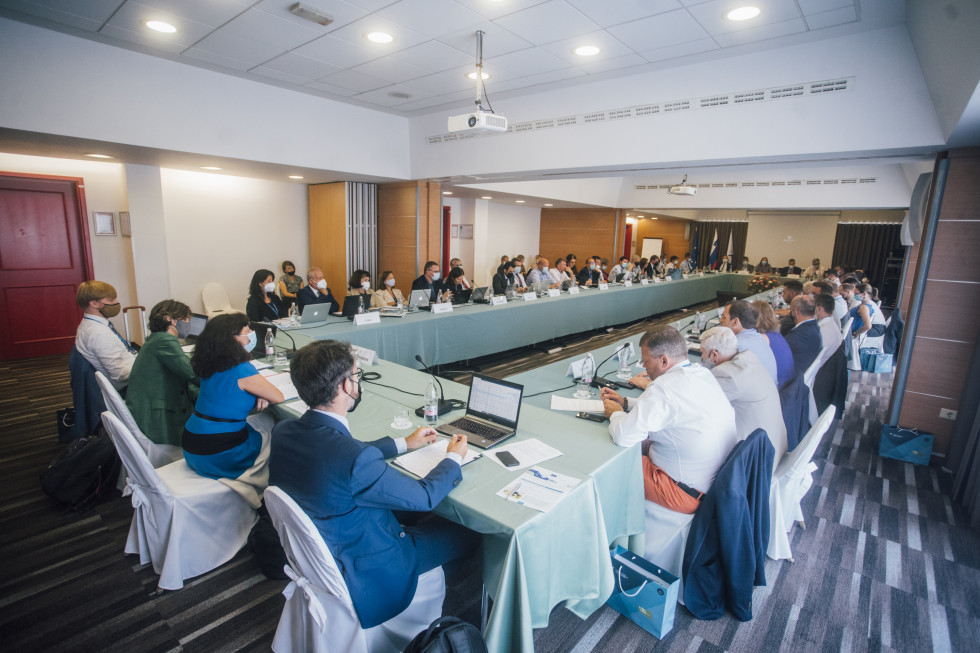EU directors-general for fisheries on the future of small-scale coastal fisheries and aquaculture in the European Union
Representatives of the 27 EU member states, the European Commission and the General Secretariat of the Council of the EU participated in yesterday's plenary session. The participants discussed the role and importance of small-scale coastal fisheries and aquaculture in the future sustainable development of the European fisheries. In this context, the discussion revolved around the question of what measures are necessary to facilitate the development of small-scale coastal fishing in the EU, while ensuring the preservation and sustainable management of fishing stocks in order to achieve the maximum sustainable yield of stocks used in small-scale coastal fishing. As regards aquaculture, directors-general expressed their views on the growth potential of the European aquaculture in the coming decade and on how the EU member states can contribute to this growth.
Director-General Ana Le Marechal Kolar stressed that, in light of the global challenges, small-scale coastal fisheries and aquaculture in the EU face numerous challenges in achieving a balance between all three pillars of sustainable development: environmental, social and economic. Almost three quarters of fishing vessels in the EU are vessels for small-scale coastal fishing and almost a half of European fishers work for small-scale coastal fishing fleets. There is potential for growth in aquaculture since the EU imports the majority of aquaculture products. According to the scientific assessment, many stocks that represent target fishing species of small-scale coastal fishing are overfished in the Mediterranean. Even though the importance of European aquaculture is growing, we have to ensure in its promotion that the development of aquaculture brings added value and contributes to the preservation of biodiversity and the mitigation of climate change. These questions are crucial because small-scale coastal fisheries and aquaculture are often closely linked to the lives of coastal and local communities. As such they make an important contribution to the local economy, also through the effects of other activities such as tourism and hospitality industry.
At the outset of the debate, the representative of the European Commission's Directorate-General for Maritime Affairs and Fisheries Charlina Vitcheva stressed that the European Green Deal is a comprehensive policy framework for the question of sustainability. The support form the future European Maritime, Fisheries and Aquaculture Fund (EMFAF) will be important for its implementation. This is the future support for the green transition of the two sectors. She emphasised that the European Commission developed new strategic guidelines for EU aquaculture. They provide a vision for the development of aquaculture over the next 10 years. Both sectors – small-scale coastal fisheries and aquaculture – have a substantial value. The growth of aquaculture and the sustainable development of small-scale coastal fisheries are needed to exploit the potential of the sectors.
At the closing of the debate, Ms Vitcheva observed that numerous member states had highlighted the key challenges. According to her, it is important that funds from the current European Maritime and Fisheries Fund (EMFF) and the future EMFAF are still available. The development should not jeopardise environmental sustainability. Fishing fleets have to be smartly adapted together with the accompanying measures, which would provide people with a complementary source of income. We need to find solutions together. There is still potential in communicating with stakeholders and in communicating the benefits of fisheries and aquaculture for the local communities. It is also important to raise awareness of the challenges of sustainable development. The European Commission commissioned a study on the impacts of aquaculture and small-scale coastal fisheries on the environment.
As part of the informal meeting, directors-general of EU member states and the representatives of the European Commission and the General Secretariat of the Council became acquainted with the characteristics of the Slovenian fisheries sector and its sub-sectors. There was a screening of a short film, presenting the projects that were realised in Slovenia and co-financed from the EMFF.


